Việt Nam Slashes Use of Death Penalty: Eight Crimes Removed, Including Corruption and Drug Offenses
Key Events * Việt Nam Abolishes Death Penalty for Corruption Amid Wave of High-Profile Trials * Chinese Survey Ship Operates Near Việt

By Magdalena Slezáková
Will Nguyen (age 34) is a Vietnamese-American public policy specialist and an activist for the Vietnamese democracy movement. He was born in Houston, Texas to a refugee family from South Vietnam. He graduated with a Bachelor in East Asian Studies from Yale University and a Master in Public Public Policy from the National University of Singapore. Last June, for participating in an anti- government protest, he was imprisoned in Vietnam; after international pressure, he was released one month later and deported from the country. Photo: Gabriel Kuchta, Deník N.
Wikipedia says the Vietnam War started November 1st, 1955. Of course, that’s according to the Americans. The Vietnamese know well that the long, hellish days lasted much longer than the 20 years before Saigon fell (1975). How could it be otherwise – after all, the vast majority of lives lost in this war were Vietnamese. “In America, the Vietnam War is seen as a strictly American affair. I’d like to remedy that,” Will Nguyen, activist and descendent of South Vietnamese refugees, says in an extended interview with Deník N.
A passage in Michael Herr’s Dispatches reads: “We took a huge collective nervous breakdown, it was the compression and heat of heavy contact generated out until every American in Vietnam got a taste. Vietnam was a dark room full of deadly objects, the VC were everywhere all at once like spider cancer, and instead of losing the war in little pieces over years we lost it fast in under a week. After that, we were like the character in pop grunt mythology, dead but too dumb to lie down. Our worst dread of yellow peril became realized; we saw them now dying by the thousands all over the country, yet they didn’t seem depleted…”
The book written by Herr, an American military reporter, has become symbolic. It cuts like a knife, and it is hard to come by another work that describes as sharply what the Americans experienced in the Vietnam War.
But what did the Vietnamese experience? After all, it was their country. Unfortunately, for nearly its entirety, few saw the war as belonging to the Vietnamese, to their loss. And to this day, the wounds have not healed.
Will Nguyen knows this all too well. He was born in the United States to a woman who fled the communists—a South Vietnamese woman, to be more precise. Except Will doesn’t agree with black-and-white divides, even in his direct experiences with the Vietnamese Communist Party: last year, he was arrested for participating in protests in Ho Chi Minh City. Or is it Saigon? They’re the same city, with two different names; one was used before the communists took over, the other is the name used today. Current maps clearly label the city Ho Chi Minh City, but try using that name with South Vietnamese refugees!
So which is it: Ho Chi Minh City or Saigon?
Nguyen: (Laughs) You tell me. I grew up with Saigon; it wasn’t until later that I found out on-paper, it was Ho Chi Minh City. I currently use both, depending on whom I’m talking to. With southern Vietnamese, I’ll use Saigon; in other contexts, Ho Chi Minh City is more appropriate. For me, either name is fine; I let the person across from me decide.
You were born in Houston, as part of the South Vietnamese diaspora – you didn’t spend your childhood in Saigon, right?
When I was young, I didn’t really pay attention to politics. The first time politics hit me in the face, however, when I was doing a school report on my country of origin. I didn’t know what the flag of Vietnam looked like, so I opened up an encyclopedia and drew a pretty red flag with a yellow star. My mother saw it and immediately told me that flag wasn’t the “correct” one! I had to then draw the yellow flag with three red stripes, the one that Vietnamese in the US still use, the flag of South Vietnam.
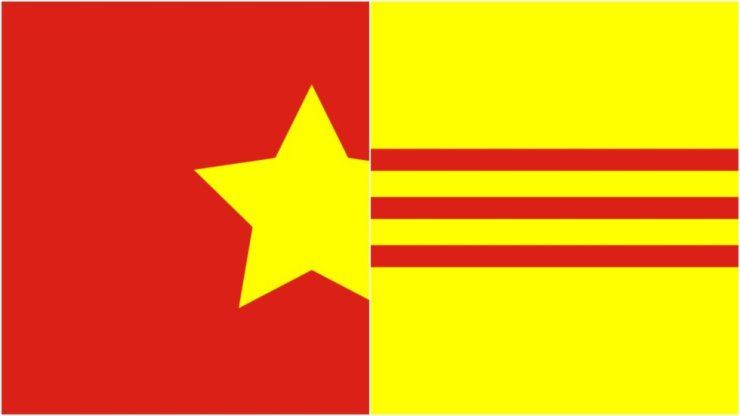
It was until later that I began slowly putting together the pieces of the puzzle. I learned how my aunt fled Saigon on April 29th, 1975, a day before the city fell to the communists; how after she arrived in the States, she helped my mother escape when war broke out between China and Vietnam in 1979. During that time, Vietnam was expelling all those of Chinese origin, so my aunt was able to sponsor my mother and helped her find forged papers claiming Chinese ancestry. My mother reached a refugee camp in Indonesia and from there, traveled to Houston.
In Texas, how did you put together the fragments of war? Americans, and the West by way of the Americans, tend to see the war as a nightmare for themselves. Oftentimes, the Vietnamese are seen as mere accessories, like decoration on military garb, or puppets in the hands of their masters.
I read whatever I could find around me. And the more I read, the more I understood that the majority of books I could find were written by Americans, about Americans; regarding South Vietnamese and the difficulties they faced during the war, you’d be hard pressed to find anything. So I began searching for books written by South Vietnamese. There aren’t very many [in English] and they aren’t very easy to find.
Luckily, I was fortunate enough to study at Yale, with its excellent libraries–whatever books they didn’t have, you could request by order. I read at least 20 or so books written by South Vietnamese authors – government figures, refugees, memoirs of life in South Vietnam before and after the revolution (1975). Similarly, I began researching sources of information from North Vietnam. Generals, spies, and figures in the North Vietnamese politburo.
Because you hit the nail on the head. In America, the Vietnam War is seen strictly as an American affair. Whatever the Americans carried out…
… would have to be suffered.
Exactly! Americans lost about 60,000 lives in Vietnam, a terrible number, but on the Vietnamese side, deaths numbered several million, and this disproportionality is never mentioned. American lives lost is still center-stage. I would like to remedy this. And I believe the first step is researching the war thoroughly from all sides, in order to shed this problematic “black-and-white” framework.
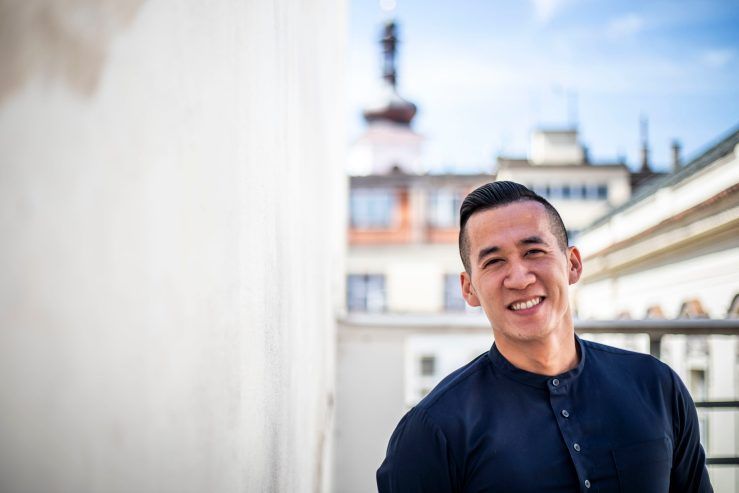
You know, it’s not just the Americans who are guilty of black-and-white thinking. We Vietnamese have a similar tendency. It’s north or south—nothing in between. But its hard to be surprised at such an ideological divide, solidified as it was by a devastating civil war. It’s still a sensitive topic. Moreover, this north-south division has historical roots. Hanoi, in the north, is seen as the cradle of Vienamese culture; as you go further south, its influence weakens. This is still true today; the Vietnamese Communist Party has a stronger base and more faithful party members in the north.
It’s like with the two Koreas, especially in the older generations. The division between right and wrong, good and bad. And sometimes even in the Czech Republic: in the north the evil communists; the
south, the righteous democrats. But South Korea had a period of authoritarianism, and in Vietnam, communism went hand-in-hand with the anti-colonial struggle for independence.The interesting thing is the communists weren’t always the only players in Vietnam. Especially in the south, there was a strong nationalist movement spearheaded by non-communists. And in the 1940s, they worked with the communists for the sake of a common goal (Under the leadership of Ho Chi Minh and the Indochinese Communist Party, the Viet Minh – a coalition of northern and southern nationalists formed during the second half of the 1930s in Nanjing, China, was officially re-established in Vietnam in 1941).
Only, the communists had their own vision of an independent Vietnam. They had greater numbers, were better organized, and were more ruthless, so in the end, they swallowed whole the other nationalists, completely obliterated them. Vietnam in the 40s and early 50s was a tumultuous time. French rule followed by the Japanese invasion, famine, then the First Indochina War, then the Viet Minh defeated France in 1954 and the French withdrew. The struggle between Vietnamese communists and Vietnamese non-communists played out against this backdrop and continued through the Cold War era—and it would be this civil struggle that would ultimately determine Vietnam’s fate.
When peace talks began in Geneva in April 1954, Vietnam was de-facto divided: the Democratic Republic of Vietnam declared by Ho Chi Minh in September 1945 ruled the north; the State of Vietnam, aligned with the French, ruled the south. Both Vietnamese states saw themselves as the only legitimate government; the Geneva Accords de-jure recognized this division, establishing a border at the 17th parallel.
Yes, with a plan for nationwide elections in 1956 to determine Vietnam’s fate and unify the country. But the south, led by prime minister Ngo Dinh Diem, knew that they could not win the election. And because the south technically did not sign the Geneva Accords, they refused to hold the elections, claiming that the elections would be rigged by the communists. Instead of the general election, the south held a referendum declaring the establishment of the Republic of Vietnam, with Diem elected president (with a spectacular 98.2% of the vote. In Saigon, President Diem received 600,000 votes out of a total 450,000 registered, according to reports). In Geneva, the US also refrained from signing the accords, which Ngo Dinh Diem counted on.
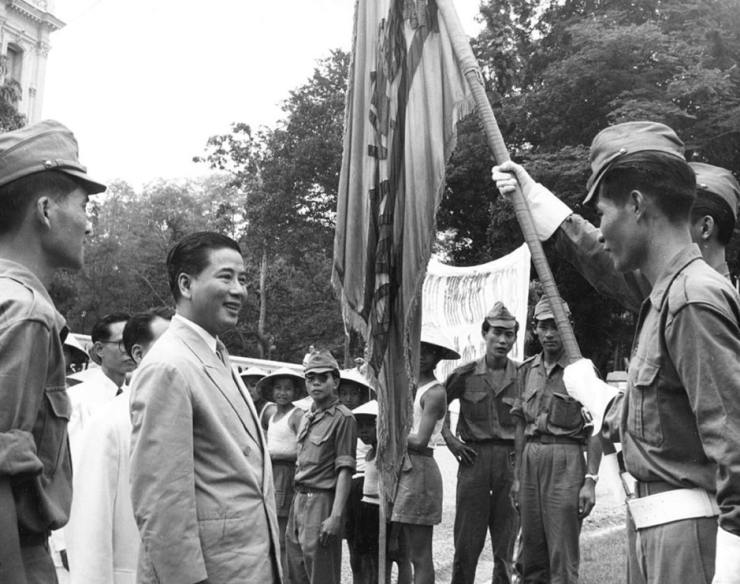
In the north during that time, the Chinese had convinced Ho Chi Minh to abandon plans for military action in the south and to wait for the election to resolve the big questions. The communists conducted a land reform campaign that killed thousands, while the south pursued its own brutal anti-communist campaign. The CIA embarked on a psychological war, sowing fear and panic among Catholics in the north, convincing perhaps more than a million to flee south.
The Americans encountered the South Vietnamese at the right time. They helped the South Vietnamese in many respects, most obvious of all, financially. I would assert that despite all this assistance, there was one decisive factor: the South Vietnamese had no idea what it meant to be a good citizen in a functioning democracy. To the majority of Vietnamese, the ideals of democracy were in reality, something completely unfamiliar, and as the Vietnamese tried to advance towards democracy…
In short, it was like a circus. Corruption was endemic, clientelism, and on top of that, war with the north. Imagine trying to build a healthy democracy in that environment! The South Vietnamese government was quite heavy-handed and far from resembling any kind of democracy; it was closer to autocracy. During the second republic at the end of the 1960s, after several coup d’etats, things calmed down a bit, elections were conducted properly, and prospects for democracy were looking up. If there was no war, who knows how far it would have progressed. You mentioned South Korea – the path to democracy for them took several decades. Same with Taiwan.
But in South Vietnam, Ngo Dinh Diem’s heavy-handed government only lasted until 1963, when the opposition assassinated him. How were the Americans involved?
Formally, Ngo Dinh Diem was President, but in actuality, he was a dictator. He was a symbol of everything we discussed earlier: authoritarianism, corruption, and nepotism. He came from a well-known family, and his relatives held many high positions of power in a type of oligarchy. There was nothing surprising about him facing powerful opposition.
In the end, a group of South Vietnamese generals decided to test the waters with the Americans. If we wanted to get rid of Diem’s government, the generals probed in a meeting with the CIA, would you support us? Kennedy’s administration gave the green light. But my god! The generals got rid of President Diem in such an awful manner. The Americans didn’t imagine it that way. They thought Diem would live a life in exile, and the government would proceed to reform.
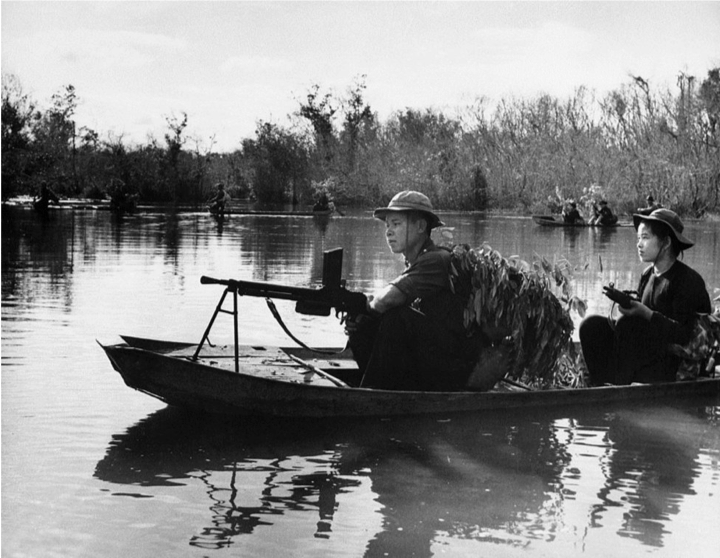
Instead, President Diem’s assassination opened up Pandora’s box. The ironic thing is some of Kennedy’s advisors warned about this very outcome: while Diem was a dictator and corruption was rampant, there existed no viable alternative to him. And it was true; the country was wracked with one coup d’etat after another. South Vietnam not only became enfeebled, but it endured continuous pressure from North Vietnam and communist insurgents in its own territory. The country’s ability to deliver its people from northern communism weakened by the day.
Up until April 30th, 1975, when Saigon was taken over by the communists. To North Vietnamese, that event was a “liberation”, but for Southerners, it was a “fall”. Is this still true?
Definitely. In the memoirs of South Vietnamese diaspora, they remember April 30th, 1975 and the “Fall of Saigon” with anguish, and not just figures from the older generations, but the majority of the diaspora’s descendents also see the event as an invasion.
And in Vietnam, where the communists have ruled for 45 years now?
The current propaganda is powerful. I believe many Vietnamese see April 30th in a positive way, a victory over colonialism, a liberation, a unification of the country. But the interesting thing is, in the south, when you speak with older people—and obviously this doesn’t happen right away because there are dangers in doing so—but when they trust you enough… my mother and I would often encounter more “sensitive” views when we were traveling around southern Vietnam. For example, taxi drivers would often reminisce positively about what life was like before 1975, as they drove us around the city.
In your travels around Vietnam, you were able to absorb a lot of literature and messaging, especially propaganda posters. These displays tap a lot into the past, right?
Most of them do. But that’s logical because the Vietnamese Communist Party derives its legitimacy from history and regularly reminds the people what it has achieved—1945 and the [August] Revolution, the defeat of the French, Ho Chi Minh, and of course, the greatest achievement of all: the liberation and unification of the country in 1975 [the latter technically occurring in 1976]. It’s like a broken record-player, stuck repeating myths.
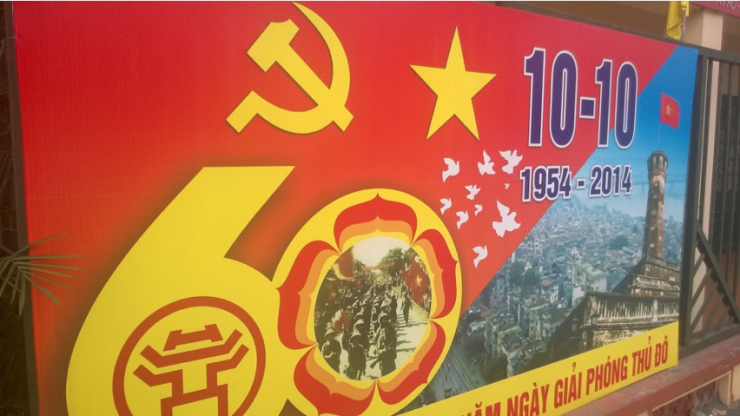
And because these pages of history bear the hallmarks of the communist party, most people don’t pay it any heed. Is it a heroic story with a fortunate ending, or is it a happy lie? For some, either case is better than the sad truth. More easily stated, one way or another, many people realize the history is suspiciously rosy. But to find the truth, one must put in the work. It takes effort, and most people simply don’t feel the need.
Why?
Because they’ve directly experienced in their daily lives that the regime they live under doesn’t give them a voice. So the result is political apathy. This is especially true with young people, who have their whole lives ahead of them. They have no desire to rehash the past; they desire a comfortable future, with a high standard of living.
But of course, not all young people are like this; I’ve gotten to know quite a few young activists from Vietnam who feel the truth is worth pursuing. A lot of it has to do with the fact that it’s easier now to find information online. It only takes a little research to reveal why the yellow flag with three red stripes is banned in Vietnam. And why the Vietnamese diaspora numbers millions across the world.
To search for truth, to absorb information and then decide for oneself – that is true independence. Not the propaganda that the regime mouth-feeds the people to maintain its grip on power. Protecting the regime is the government’s number one goal. The Party has to make sure the boat doesn’t rock too much under its feet, and along with propaganda, it must also ensure that the economy develops while it conducts a balancing act between opposing China and allowing Chinese influence.
How are relations between the Vietnamese Communist Party and the Chinese Communist Party?
Very close, in an existential way. Vietnamese communists owe much to their Chinese counterparts, but at the same time, they have to be extremely careful not to be seen as Chinese puppets. This demands sufficiently independent behavior, opposing China in moderation, and at the same time, making sure not to offend their Chinese patrons.
Are they really patrons?
You know, Vietnamese leaders are slowly realizing they’re skating on the thinnest of ice. While I was imprisoned in Saigon, I spoke with police investigators about the situation in the South China Sea, and it was hard to miss the frustration written on their faces. They have to oppose China because that’s part of the Vietnamese national mythology: China is our hereditary enemy, and it’s forever finding ways to swallow Vietnam. If they don’t oppose China, then they face the danger of public opposition. That’s why Hanoi tries to find international support in their case against Chinese aggression. But it’s all one big act. No vociferous pronouncements will change the fact that China currently has the upper-hand in the South China Sea. China is several times larger and stronger than Vietnam, and Hanoi is fully cognizant of this, as well as the fact that Vietnam is economically dependent on China. And besides, the Vietnamese Communist Party imitates the Chinese Communist Party on a fundamental level. Their historic consolidation of power, their land reforms, and more recently, the cybersecurity laws.
And the general secretary? The similarities between Xi Jinping and Nguyen Phu Trong, the head of the Vietnamese Communist Party, can’t be ignored: a strong, hard-line leader, pursuing an anti-corruption campaign.
Of course; if you observe down to a minute-enough level, you’ll always find differences, but the truth is the Vietnamese and Chinese models of rule are quite similar – including the issue of Trong becoming both General Secretary and President. Though for most of its history, the Vietnamese Communist Party has followed the path of collective leadership, Trong has spearheaded an anti-corruption campaign very similar to that of Xi: sure, you’re cleaning up the ranks, but you’re also inserting your own allies into positions of power.
The two parties [and their historical trajectories] are not exact replicas. But there are more than enough similarities to remind us of Mark Twain’s observation: “history doesn’t repeat itself, but it does rhyme.”
You actually mentioned something I wanted to ask you about: last year, you were incarcerated in Vietnam. You went straight to prison after an anti-government protest in Saigon, right?
I had graduated [from my master’s program] in May and after that, had flown to Vietnam. When I found out [a few days prior] that there would be protests, I decided to attend because I also believed the two proposed laws were harmful to the Vietnamese people.
I walked the streets with protestors, cell phone in hand, recording as much as I could and uploading it immediately onto social media. It wasn’t an easy thing to do because the internet was slowed. The government often finds ways to prevent the spread of information. After a couple of hours, we ran up against a formation of police officers who stopped us and tried to get us to turn away from the city center. But I could tell that the officers were ill-at-ease; they were young, and looked just as worried and fearful as the protestors. It seemed like all it would take was one person to push through to break the line.
So I did it, and they ultimately let us through. But after a few intersections, the police parked a row of pick-up trucks across the road to block it. I wanted to help the people cross the barrier – I knew I could take on a little more risk because I wasn’t a Vietnamese citizen and I didn’t face as serious of punishment as they did. I knew I could be arrested, but to be beaten in the middle of the streets was definitely something I did not expect.
How many people were there around you?
Hard to say, but the streets were impassable, surging with people. They charged me not only with “disturbing public order” but added on the aggravating factor “causing serious traffic congestion”. They blamed me for making 14 people miss their flights.
And what were you facing?
Up to 7 years in prison.
At least you confessed on TV! And that’s yet another similarity between China and Vietnam: a recorded confession broadcast on national television…
It was all for show. In order to maintain their hold on power, the Party choreographs one performance after another and forced televised confessions are just one part of it. I had known about this “song-and-dance” prior to being captured, so I wasn’t surprised when they made me participate. But mostly, nobody was particularly enthusiastic about doing it. It was all pretty tiring: the security officers and I didn’t want to do it, but because the orders were coming from above, we wanted to just get it out of the way.
And you participated?
If I didn’t, it would only complicate things. Not just for me, but also for the investigators, the people who were in charge of (processing) my case. They treated me well enough, though obviously I knew it was related to the fact that I was American and that my case was receiving widespread international attention.
Moreover, I refused to lie. When they wanted me to apologize for causing traffic congestion or for making my friends and family worry, that wasn’t a big deal. But there was a part where they said I tried to flip a police truck and other things. I refused to read that. They accepted it and moved on.
As in there was a script?
The whole thing was so surreal. First, I wasn’t wearing the appropriate clothing, because I was a prisoner, so one of the police officers gave me the button-down shirt off his back to wear. Then, they styled my hair and had me sit down in front of the camera – we did around 5 takes, until I read the script convincingly enough.
It all sounds like a joke, but in actuality, it’s nothing to laugh at right? Especially those with Vietnamese and not American citizenship.
Exactly. Suddenly, I had fallen into the belly of this oppressive regime I had researched for so many years; it was there that I was able to fully realize that the system ran on fear. It doesn’t have to be the kind of fear that stops your heart or takes your breath away. But as long as that fear becomes an abided part of your life, like an old coat, mundane and commonplace, then the system remains in place.
Like Hannah Arendt has written of, it’s all about the diffusion of responsibility: “I was just following orders!” You’re sitting behind bars, observing how police officers observe you. And you realize that they’re just cogs in the machine. But it’s precisely all of these small cogs that keep the machine going. If they weren’t there, the entire system would collapse. At the same time, they’re all just normal people. Outside of work hours, when they weren’t interrogating me, we would talking to one another like normal people.
With the small detail that you were behind bars and the police officers were in front.
Of course. You know, dehumanizing the other side doesn’t help anyone; don’t even get me started on caricaturing them as demons. I grew up in an environment where people spoke of communists as man-eating devils, and dissident propaganda often depicts Ho Chi Minh with horns. What is this good for? The more you put pressure on them in this way, the more they will dig in their heels in siege mentality. And that mentality leads to an increasingly oppressive regime. I believe in doing the opposite. Jettison the black-and-white paradigm and fracture an otherwise monolithic ideology.
How?
By treating these individuals like human beings. By convincing them that those who want to reform the system are not their enemies. As long as overseas Vietnamese communities across the world continue to demonize the communists as they do, then nothing will change. The banality of evil works both ways: people mold the system, but the system also molds the people. We have to work to fill the gap between the two sides, or at the very least, build some kind of bridge. I’m purposefully avoiding the word “reconciliation” because the communists used it after 1975, and then ultimately sent southerners to re-education camps.
This reminds me of the situation in the Czech Republic after the Velvet Revolution. It’s a shame how the party and corruption went hand-in-hand, but enough people were able to “change outfits” after the transition [to continue their behavior]; some didn’t even bother to change. What’s going to happen if the same people are able to survive reform efforts in Vietnam?
I believe the Vietnamese Communist Party has a right to exist – this is something anti-communists have excluded me for saying, even accusing me of Stockholm Syndrome. But then there are anti-communists who are impressed with Trump and openly support him, and that’s something that’s completely absurd to me.
But most importantly: the Vietnamese Communist Party has four million party members. Their numbers are decreasing, and the Party itself is purifying in an ideological sense, getting smaller and older. But four million is still a lot. What are we going to do with them? Vietnam has suffered several decades of war. Millions have lost their lives, several more million have had to flee their homeland, and hundreds of thousands have lain their corpses at sea in pursuit of freedom… is this not enough? I understand your question, and I can’t say it doesn’t worry me. But what other way do we have to pursue reform but this?
I’m not so naïve as to think that we only need dialogue to reform a totalitarian regime. Obviously you can extend your hand across the table, but if the other side is not willing, then there has to be something to push them to the table. The people must speak up for themselves; they have to march if need be. Reform can’t be achieved without it. And in a similar vein, I also hope that young people reconsider joining the Party.
The economy plays a huge role: Vietnam’s labor productivity is quite low because the regime robs people of their initiative. Those with enough drive, those who can overcome the apathy find happiness overseas, where they go to work or study. But a number return with open eyes. For others, the internet opens their eyes. And people are slowly realizing, it doesn’t pay to be politically apathetic – if you don’t want to decide politics, then someone else will decide for you.
https://twitter.com/will_nguyen_
•••
The above article is an English translation of https://denikn.cz/222401/o-valce-ve-vietnamu-se-siri-stastna-lez-namisto-smutne-pravdy/ and was originally published on October 31st, 2019, in the Czech newspaper Deník N.
Vietnam's independent news and analyses, right in your inbox.